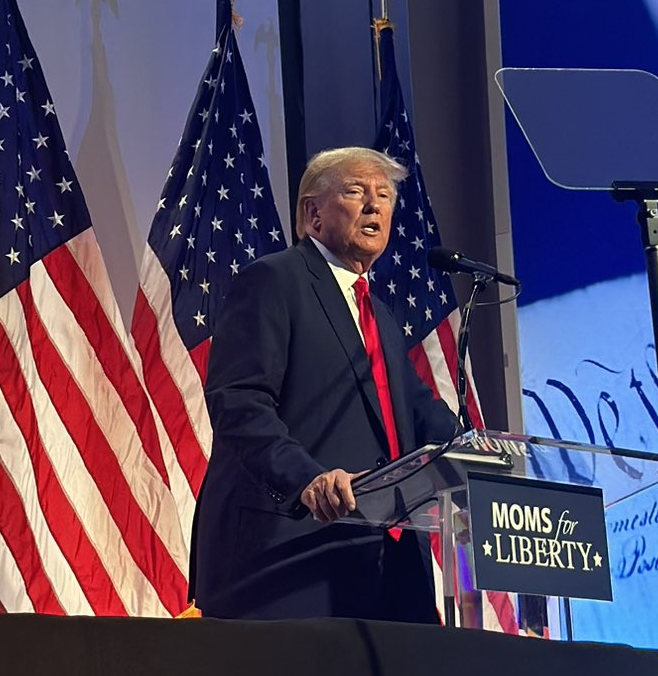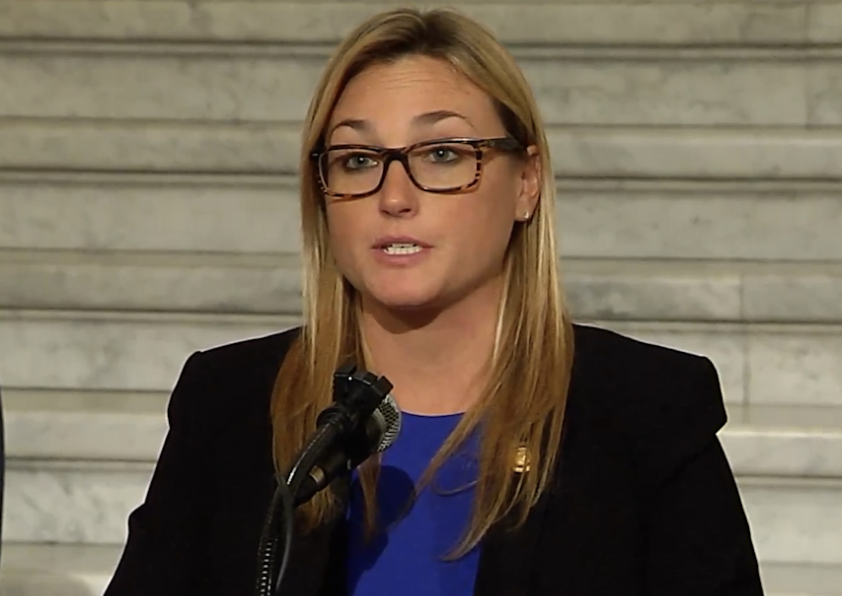
In a display of the political power of the parents’ rights issue, five Republican presidential candidates—including former President Donald Trump — appeared at this weekend’s Moms for Liberty Joyful Warriors National Summit in Philadelphia.
The crowd of more than 650 at the Philadelphia Marriott cheered Gov. Ron DeSantis, who noted, “I think moms are the key political force for this 2024 cycle.”
Tia Bess, outreach director for Moms for Liberty, introduced DeSantis, describing how she fought to reopen Florida schools for her autistic son, who needed in-person learning.
“I made a decision to fight for my kid,” she said. “It was my governor who put the power back in the hands of the parents with a parental bill of rights…Gov. DeSantis reopened schools in the fall of 2020.”
DeSantis said Florida enacted a parents’ bill of rights because he understands schools should “support students and parents” not “supersede the rights of parents.”
“Parents have the fundamental right to direct the education and upbringing of their children…Every parent in this country should have the wherewithal to send their child to the school of their choice.”
He said his state has universal education savings accounts where the money follows the students in Florida. There are also 363,000 students in charter schools. He said Florida ranked third and fourth in the country in fourth-grade reading and math. Florida parents also have the right to know what curriculum is being taught.
DeSantis also refuted claims that keeping sexually explicit content out of school libraries is a “ban” and touted Florida’s efforts to force textbook companies to change “woke” textbooks “that were totally off their rocker.”
“We don’t subcontract our leadership out to woke corporations,” DeSantis said about Disney’s opposition to the ban on teaching young children about gender ideology. “We oppose the sexualization of children,” said DeSantis. “We will fight any institution seeking to rob our children of their innocence. On those principles, we will never compromise.”
Trump gave a wide-ranging speech, touching on parental rights and foreign policy and criticizing Biden’s “corruption” for taking “millions and millions of dollars from China.”

Moms for Liberty co-founder Tiffany Justice talks to Gov. Ron DeSantis.
“He recently ordered his top political opponent arrested. That’s me,” said Trump.
“They’ve even targeted you, patriotic parents, at school board meetings,” he said while ignoring bad actors. “Antifa. BLM. Corrupt thugs, they don’t go after at all.”
“We have proven beyond all doubt there is no earthy force beyond the love of a mother for her children,” Trump said. Mothers across the country have “taught the radical left Marxists a lesson they’ll never forget: Don’t mess with America’s moms.”
And the “radical left slandered Moms for Liberty as a hate group,” he said. “These people are sick.”
The Southern Poverty Law Center, a progressive activist organization, included Moms For Liberty on their “Hate Map,” along with groups like the Ku Klux Klan.
Trump mentioned the border crisis, the Ukraine-Russia war, and Biden’s disastrous withdrawal from Afghanistan. Trump predicted he would win suburban women, a key demographic because those women oppose endless wars.
“I will stop World War III,” Trump said.

Warrington Supervisor Vanessa Maurer and pro-life activist Kathy Barnette
“We will put parents first,” said Trump. “We will put children first. We will put America first again.”
Trump added, “We want our children to love America as much as we love America.”
If re-elected, he would send the responsibility for education back to the states and do away with diversity, equity, and inclusion mandates.
He also promised to ban “sexual mutilation in all 50 states,” a reference to performing permanent sex-change medical procedures on children.
“Instead of taking children to church, they’re taking them to drag shows,” he said. “We must take school boards back.”
He reminded the group that he appointed 300 federal judges and three U.S. Supreme Court justices. He praised the high court’s ruling Thursday overturning affirmative action and the landmark ruling last year overturning Roe v. Wade.
Former South Carolina governor and former U.N. Ambassador Nikki Haley said moms care about everything from crime to national security. She mentioned the country’s $32 trillion debt and blamed Republicans and Democrats for wasting money.
On education, she said, the country had problems with poor test scores before COVID.

Ambassador Nikki Haley
“You’ve got biological boys playing in girls’ sports,” she said. “This is one of the biggest women’s issues of our time…We have to fight for our girls.”
While massive protests predicted by opponents of parental rights failed to materialize, about 100 or so protesters gathered outside the venue during Trump’s speech. And vandals defaced the Museum of the American Revolution, where the Moms held their welcome dinner Thursday evening.
Warrington Township Supervisor Vanessa Maurer came to support Moms for Liberty when she heard about protests, even though she’s not a member.
“I like their message,” she said. “When I saw all the protests saying they wanted to shut down a ‘group of domestic terrorists,’ I thought, ‘I know a lot of these moms. This is ridiculous.’ If we don’t stand up and support these groups that are supporting our liberties and our freedoms, then it’s really going to be lost. We have to have people start speaking up and support people who are supporting our freedom of speech, our liberties, and our faith.”
Kathy Barnette, a pro-life activist who ran for Congress and the U.S. Senate, gave the invocation Friday morning.
“I’m a mom,” she said to DVJournal. “There is no more powerful group of people than moms from conception to whatever the natural end may be. There is no more powerful role for our nation than a mom who cares about her family, her children, and the kids the country they’re going to inherit. This is amazing to see moms take their role.”
“I homeschooled my kids,” she said. “Ten years ago, I saw what parents are seeing now…Today all these moms being involved is encouraging.”
Upset over school COVID lockdowns, Whitpain resident Maureen Bogat started the Montgomery County chapter of Moms for Liberty with Vicki Flannery.
Then parents saw what was being taught.
“My child was online one day, and she was told…because she was White, she was privileged. There was no such thing as reverse racism. I’m like, ‘What is this? Shut that off now. What is that garbage they’re teaching you? What does it have to do with school?’ It opened parents’ eyes.”
Tina Descovich, who founded Moms for Liberty with Tiffany Justice, said they both were school board members in Melbourne, Fla. and decided to launch the organization to help all moms advocate for their children because of what they’d learned “behind the education curtain.”
“We saw the authority and power that school boards have to impact student learning,” she said. “With the education crisis we have in America right now, with two-thirds of fourth graders not being able to read on grade level, with the lowest reading scores since the 1980s and the lowest math scores that have just come that are the lowest we’ve had recorded, we feel we need to get quality people serving on school boards so that we can improve educations.”
Asked about the recent brouhaha over one chapter’s inclusion of a quote from Hitler in their newsletter, she said, “It was a mom in a small local chapter. She put the quote in the newsletter as a warning about who controls education controls the country. She put it as a warning.”
Moms for Liberty has nearly 100,00 members with 195 chapters in 43 states, with Pennsylvania the second highest after Florida. There are chapters in 27 Pennsylvania counties, including Philadelphia, Chester, Delaware, Montgomery, and Bucks Counties.














